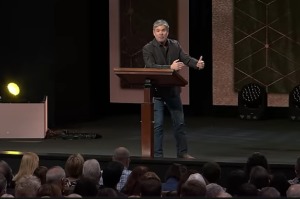The Power of Words and the Nature of Sin
To be a Christian is to be a person who cares about words. We care about definitions and implications. Our aim is not to be contentious or obstreperous. Our aim is to be true and to speak in a way that strengthens the truth. We care about words because words communicate ideas and ideas have consequences. We pay attention to language because God has revealed himself through it. Words matter to God. They should matter to us.
Having said all that, I'd like to suggest we think more carefully about one of our new favorite words: brokenness. I'm not on a crusade to ban the word from the evangelical lexicon. You don't have to apologize if you say the word in front of me. It's not a bad word. It's just not an adequate word.
What do we communicate with the word "brokenness"? It seems to me the word is a rough synonym for "messed-up-ness." Worship leaders ask us to confess our brokenness. Pastors tell us we all have brokenness. Sinners under conviction reveal their struggles with brokenness. Often I hear the word used with reference to sexual sin. Someone with a porn addiction may admit his sexual brokenness. Or someone speaking against homosexuality may be quick to assure his audience that we all struggle our own form of sexual brokenness. The word shows up in many delicate situations.
And yet, the word is inadequate at best and misleading at worst. On the good side, "brokenness" conveys an important truth about sin. When we develop an insatiable appetite for porn, when we long for same-sex partners, when we can't live without people's approval, we are not functioning the way God intended. God's Edenic design for human flourishing did not include addictions, unnatural lusts, and fear of man. Marred by sin, none of us is the way we are supposed to be. We are all broken.
But as a metaphor for sin, "brokenness" is seriously limited. The term does not convey a strong sense of moral culpability. If anything, it suggests a helplessness in the face of external forces and circumstances. It gets nothing of the Godward direction of sin. In fact, the term "brokenness" sometimes feels like a safer, less-offensive euphemism for sin. Instead of confessing rebellion, disobedience, guilt, or moral evil, we only have to acknowledge that somethin' ain't right. We don't work the way we should. We've been wounded before. We've had a hard go of it. I'm not suggesting those who use the term "brokenness" are trying to avoid their sins or the minimize the sins of others. But the language can have that effect.
In Reformed Dogmatics, Herman Bavinck examines the different Hebrew and Greek words for sin. The list of definitions is daunting: missing the mark, departure from the right way, twistedness, wrongness, deviation from the right direction, crossing a set of boundaries, breaking a covenant, apostasy, rebellion, deviant conduct, godless behavior, offense, unfaithfulness, infidelity, betrayal, disobedience, violation, lawlessness, guilt. "By far the majority of these names, Bavinck maintains, "describe sin as 'deviation, a violation of the law." In citing 1 John 3:4, he concludes that "Scripture consistently views sin as lawlessness" (3.129-30).
Granted, it is no violation of Scriptural truth to use non-biblical language and metaphors to describe our sin. But overtime it usually proves unwise. The biblical language for sin is stronger and more God-directed than makes us comfortable. The present Christian culture gravitates toward language that is inner-directed and therapeutic. We prefer the language of brokenness and woundedness, even though these words in the Bible tend to describe physical pain or divine punishment (Isaiah 30:26). Sin is almost never, if ever, described as personal malfunction. It is, instead, seen as an offense to God, a violation of his law, and liable to punishment. We may be broken, but that doesn't describe the half of it. We need a Savior, not just a Handy Man.
This article was originally posted here.





























